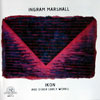Ingram Marshall, "IKON and Other Early Works"
New World
 Sitting uncomfortably wherever it is that minimalism overlaps with bothnew age and American academic experimentation, Ingram Marshall is a bitof a baffler. I liked Fog Tropeswhen I first heard it on the radio way back in my college days butdiscovered, when I bought a disk of it not so long ago, that I hadgrown out of it, as I have with most minimalism. The other works onthat New Albion disk had decidedly off-putting new age spiritual cheesegoing on. However, the sleeve notes that Marshall wrote for the CD ofCharlemange Palestine's Schlingen Blängen convince me that itmisses the mark to dismiss him as a secondary figure in commercialminimalism with a bit of a spiritual bent. Present as a young man inthe New York minimalist scene of the '60s, Marshall had goodconnections and began experimenting with tape and electronic music andhas kept it up since. This CD documents his tape and electronic outputduring the years of minimalism's downfall in the 1970s as nascentneo-romantic composers like Reich and Glass co-opted it for their ownends and gave it a capital M. Five of the seven pieces are tapecompositions based on human voices, using repetition and electronicmanipulation to build up eerie artificial sound spaces. These piecesrange from the quite effective Cortez (see Brain v06i16) to the rather unconvincing Weather Reportand suggest that Marshall was sincere and committed to working hardwith very limited personal artistic resources. However, the remainingtwo pieces, Rop på fjellet and Sibelius in His Radio Corner,lay bare Marshall's abject skills in harmony and melody withrun-for-cover embarrassing horribleness. An artist has to bothcultivate and rely upon his or her voice of artistic conscience—thatlittle Jiminy Cricket voice that whispers in your ear "Dude, that kindasucks. Keep it to yourself and work on something else instead." Thisvoice is one of an artist's most crucial assets. I think Marshall,deceived by the success of his music with those New Albion typeaudiences, allowed himself to overrule his conscience a few times toooften to maintain credibility. This CD shows that, unlike many otherless than entirely great composers, this wasn't just a problem reservedfor his later years.
Sitting uncomfortably wherever it is that minimalism overlaps with bothnew age and American academic experimentation, Ingram Marshall is a bitof a baffler. I liked Fog Tropeswhen I first heard it on the radio way back in my college days butdiscovered, when I bought a disk of it not so long ago, that I hadgrown out of it, as I have with most minimalism. The other works onthat New Albion disk had decidedly off-putting new age spiritual cheesegoing on. However, the sleeve notes that Marshall wrote for the CD ofCharlemange Palestine's Schlingen Blängen convince me that itmisses the mark to dismiss him as a secondary figure in commercialminimalism with a bit of a spiritual bent. Present as a young man inthe New York minimalist scene of the '60s, Marshall had goodconnections and began experimenting with tape and electronic music andhas kept it up since. This CD documents his tape and electronic outputduring the years of minimalism's downfall in the 1970s as nascentneo-romantic composers like Reich and Glass co-opted it for their ownends and gave it a capital M. Five of the seven pieces are tapecompositions based on human voices, using repetition and electronicmanipulation to build up eerie artificial sound spaces. These piecesrange from the quite effective Cortez (see Brain v06i16) to the rather unconvincing Weather Reportand suggest that Marshall was sincere and committed to working hardwith very limited personal artistic resources. However, the remainingtwo pieces, Rop på fjellet and Sibelius in His Radio Corner,lay bare Marshall's abject skills in harmony and melody withrun-for-cover embarrassing horribleness. An artist has to bothcultivate and rely upon his or her voice of artistic conscience—thatlittle Jiminy Cricket voice that whispers in your ear "Dude, that kindasucks. Keep it to yourself and work on something else instead." Thisvoice is one of an artist's most crucial assets. I think Marshall,deceived by the success of his music with those New Albion typeaudiences, allowed himself to overrule his conscience a few times toooften to maintain credibility. This CD shows that, unlike many otherless than entirely great composers, this wasn't just a problem reservedfor his later years.
 Sitting uncomfortably wherever it is that minimalism overlaps with bothnew age and American academic experimentation, Ingram Marshall is a bitof a baffler. I liked Fog Tropeswhen I first heard it on the radio way back in my college days butdiscovered, when I bought a disk of it not so long ago, that I hadgrown out of it, as I have with most minimalism. The other works onthat New Albion disk had decidedly off-putting new age spiritual cheesegoing on. However, the sleeve notes that Marshall wrote for the CD ofCharlemange Palestine's Schlingen Blängen convince me that itmisses the mark to dismiss him as a secondary figure in commercialminimalism with a bit of a spiritual bent. Present as a young man inthe New York minimalist scene of the '60s, Marshall had goodconnections and began experimenting with tape and electronic music andhas kept it up since. This CD documents his tape and electronic outputduring the years of minimalism's downfall in the 1970s as nascentneo-romantic composers like Reich and Glass co-opted it for their ownends and gave it a capital M. Five of the seven pieces are tapecompositions based on human voices, using repetition and electronicmanipulation to build up eerie artificial sound spaces. These piecesrange from the quite effective Cortez (see Brain v06i16) to the rather unconvincing Weather Reportand suggest that Marshall was sincere and committed to working hardwith very limited personal artistic resources. However, the remainingtwo pieces, Rop på fjellet and Sibelius in His Radio Corner,lay bare Marshall's abject skills in harmony and melody withrun-for-cover embarrassing horribleness. An artist has to bothcultivate and rely upon his or her voice of artistic conscience—thatlittle Jiminy Cricket voice that whispers in your ear "Dude, that kindasucks. Keep it to yourself and work on something else instead." Thisvoice is one of an artist's most crucial assets. I think Marshall,deceived by the success of his music with those New Albion typeaudiences, allowed himself to overrule his conscience a few times toooften to maintain credibility. This CD shows that, unlike many otherless than entirely great composers, this wasn't just a problem reservedfor his later years.
Sitting uncomfortably wherever it is that minimalism overlaps with bothnew age and American academic experimentation, Ingram Marshall is a bitof a baffler. I liked Fog Tropeswhen I first heard it on the radio way back in my college days butdiscovered, when I bought a disk of it not so long ago, that I hadgrown out of it, as I have with most minimalism. The other works onthat New Albion disk had decidedly off-putting new age spiritual cheesegoing on. However, the sleeve notes that Marshall wrote for the CD ofCharlemange Palestine's Schlingen Blängen convince me that itmisses the mark to dismiss him as a secondary figure in commercialminimalism with a bit of a spiritual bent. Present as a young man inthe New York minimalist scene of the '60s, Marshall had goodconnections and began experimenting with tape and electronic music andhas kept it up since. This CD documents his tape and electronic outputduring the years of minimalism's downfall in the 1970s as nascentneo-romantic composers like Reich and Glass co-opted it for their ownends and gave it a capital M. Five of the seven pieces are tapecompositions based on human voices, using repetition and electronicmanipulation to build up eerie artificial sound spaces. These piecesrange from the quite effective Cortez (see Brain v06i16) to the rather unconvincing Weather Reportand suggest that Marshall was sincere and committed to working hardwith very limited personal artistic resources. However, the remainingtwo pieces, Rop på fjellet and Sibelius in His Radio Corner,lay bare Marshall's abject skills in harmony and melody withrun-for-cover embarrassing horribleness. An artist has to bothcultivate and rely upon his or her voice of artistic conscience—thatlittle Jiminy Cricket voice that whispers in your ear "Dude, that kindasucks. Keep it to yourself and work on something else instead." Thisvoice is one of an artist's most crucial assets. I think Marshall,deceived by the success of his music with those New Albion typeaudiences, allowed himself to overrule his conscience a few times toooften to maintain credibility. This CD shows that, unlike many otherless than entirely great composers, this wasn't just a problem reservedfor his later years.



